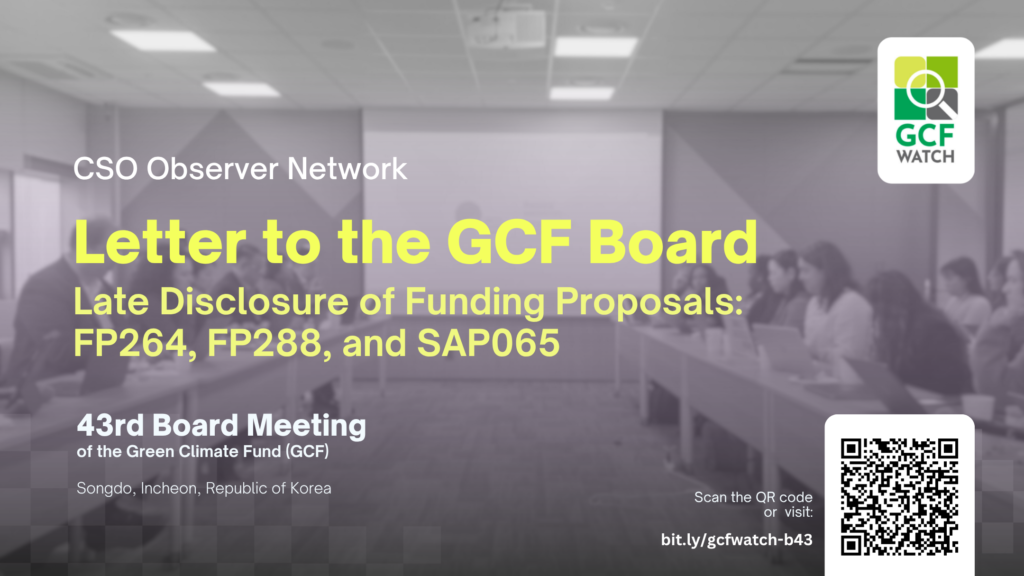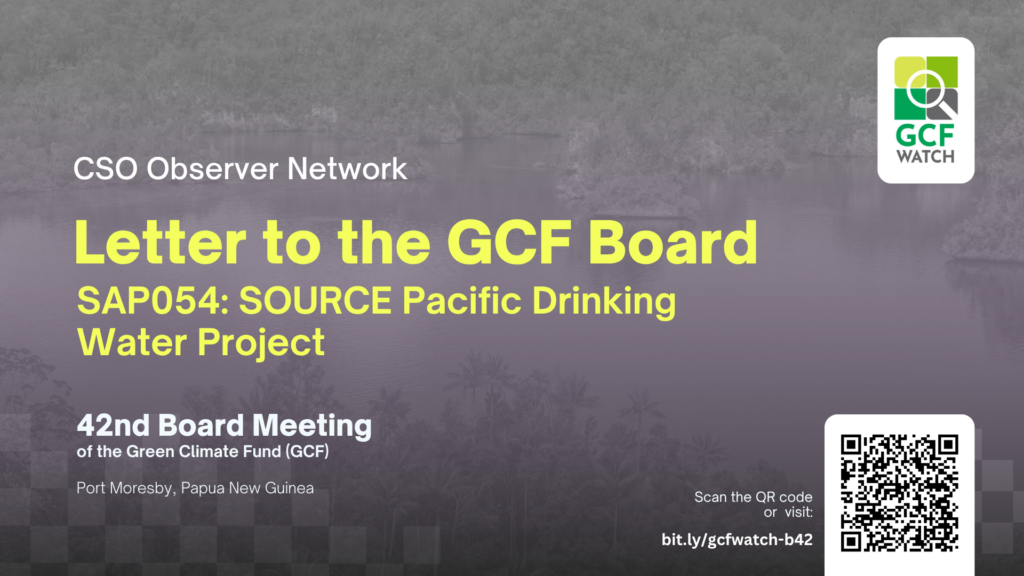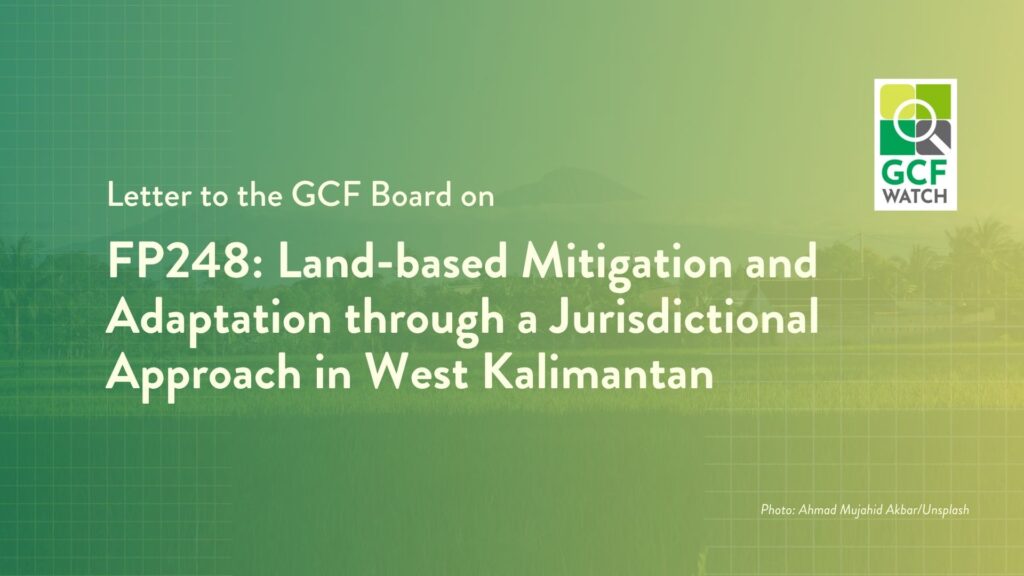Statement on serious concerns over FP212 – &Green Fund: Investing in Inclusive Agriculture and Protecting Forests (FMO)
GCF Observer Network of Civil Society, Indigenous Peoples, and Local Communities
Serious concerns over FP212
&Green Fund: Investing in Inclusive Agriculture and Protecting Forests (FMO)
To Board Members of the Green Climate Fund:
During B.36, the GCF Board will be considering whether to approve FP212, “&Green Fund: Investing in Inclusive Agriculture and Protecting Forests”, submitted by the Dutch Development Financing Company (FMO). A decision to approve this proposal would risk impacts that are antithetical to the just climate action the GCF seeks to support and create a substantial reputational risk for the GCF.
As civil society representatives, with extensive experience in reviewing projects seeking GCF funding, we consider this programme to be highly dangerous. Our insights and deep concerns come from our thorough review of the official, publicly disclosed documentation of the funding proposal, direct communication with the FMO, and conversations with local communities and organizations that are close to the territories where the programme is to be implemented. This programme should not be eligible for any climate funding and much less be presented as a climate investment deserving GCF support, as it does not comply with the most basic mandate of this progressive and transformational Fund.
In this funding proposal, FMO requests a contribution of US$189.35 million from the GCF, with US$180 million in loans and US$9.35 million in grants, to support the &Green Fund. It also identifies co-funding of US$792.27 million from other sources, thus classifying the program as ‘large’. If approved, this would represent a huge investment NOT in transformative or paradigm-shifting climate action, but rather in business-as-usual practices that have proven to undermine environmental integrity, effectively greenwashing the very practices that must stop if we want to have any hope of addressing the climate crisis.
The programme seeks to transform the main production chains of tropical commodities (livestock, soy, coffee, palm oil, rubber, cocoa and firewood/timber) to make them socially inclusive and free of deforestation, so that they are more commercially viable and replicable on a large scale. To this end, FMO will offer through the “&Green Fund”, which already exists, financing and technical assistance to large agribusiness companies in Brazil, Cameroon, Colombia, Côte d’Ivoire, Democratic Republic of Congo, Ecuador, Gabon, Indonesia, Laos, Liberia and Zambia.
It is well known that large-scale commodity production chains are particularly problematic environmentally, climatically and socially, and are one of the main drivers of deforestation in tropical forests. It is also no secret that some of the biggest and most profitable companies that produce these products have been the driving forces behind illegal deforestation that public policies in all these countries have not been able to decrease, let alone stop.
It is therefore surprising and quite disturbing that the “&Green Fund” portfolio currently funds the major players in the agricultural market who, as extremely profitable, large transnational companies, do not encounter obstacles in accessing traditional financing for their operations from the banking and financial system. (This was pointed out by the ITAP in paragraph 44 of its assessment of the programme). As such, the implementation of sustainable practices by these companies is not determined by lack of access to funding, but rather by the willingness to do so.
In this regard, many of the companies who will be beneficiary of the programme have evidenced little to no willingness to implement sustainable practices, and instead have shown a poor environmental record. For example, the Brazilian company Marfrig is the second largest animal protein processor in Brazil and one of the beneficiaries of the “&Green Fund”. Marfrig has been accused several times of fueling illegal deforestation (see, for example, here and here). The IDB even canceled a planned investment to Marfrig given the risk it would violate the IDB’s sustainability policies. Moreover, two of the Indonesian companies that are part of the program proposal, PT Hilton Duta and PT Lestari Utama, have already been accused of illegally growing palm oil in protected forest areas.
Additionally, the proposed programme does nothing to acknowledge and address some of the main challenges and dynamics that promote illegal deforestation in commodity production chains, such asthe practice of ‘cattle laundering’. Cattle laundering, very common in some of the target countries -particularly Brazil and Colombia-, refers to fattening cattle in “dirty” ranches that have been illegally deforested -including deforestation in protected areas-, only to move them to “clean” ranches before they go to the slaughterhouses. This practice obscures the damage the cattle have caused, and has proven extremely difficult for both companies and supervisory bodies to trace. In this sense, governments might have strong regulations on illegal deforestation in place, but lack the capacity to track down and monitor the extremely complex dynamics which sustain it. On the other hand, private sector initiatives on their own have shown little evidence to have the capacity to carry out this task on their own, as it would require an actual strengthening and strong collaboration with the public sector to respond to this problem. Failing to acknowledge and address this, while funding companies that have been accused of it, gives us no guarantee that FMO will properly prevent it in the context of the” &Green Fund”.
The due diligence processes to be implemented within the scope of the programme, are weak, especially for a I-1 category high risk financial intermediation approach. As this is a programme that intends to fund subprojects post funding proposal approval, the GCF will have little opportunity to oversee the type of subprojects that will be implemented with its resources. Moreover, the proposed audit process seems to only be applied in the initial stages of the subprojects and not sustained throughout subproject implementation. As a guarantee that companies will comply with environmental and social safeguards, companies must publish non-deforestation policies. However, there are no particular measures envisaged by the “&Green Fund” to cancel the provision of funds if companies engage in illegal deforestation and/or other illegal practices in their activities. In our meeting with the FMO they openly said that a breach in the action plan of the beneficiary companies would render a reputational implication, not necessarily a financial one.
Finally, we were contacted by Duda Salabert, Brazilian congresswoman, who is a member of the Commission on Environment and Sustainable Development of the Legislative Chamber of Brazil, who was deeply worried by this programme. She has placed an “indicação parlamentar”, which is a ‘parliamentary recommendation’ sent from the Legislative to the Executive power of State, regarding a specific matter. In her statement, addressed to the Ministry of Finance (where the Brazilian NDA is located), she recommends opposing the programme. In addition to some of the main concerns we have raised about the project here, she also questions the “country ownership” of the programme, considering that the non-objection letter from the Brazilian government was issued in 2022 during Jair Bolsonaro’s tenure, which was marked by the dismantling of environmental and climate policies in Brazil.
We have heard the Board assert before that scarce climate funds coming from the GCF should not be allocated to financing large companies that face no obstacles in accessing funding. This is a clear case of missing additionality in providing GCF financial support simply on financial terms. Even more significant is the reputational risk that the GCF faces – as it is seeking replenishment – in supporting such an ill-conceived financing request. We also believe we can agree on the fact that the companies fueling deforestation should not receive climate funding.
As civil society organizations, working tirelessly to bring you the voices of the communities and people from programme-affected territories, we urgently ask you to consider our concerns, the reputation of the GCF, and the devastating precedent that such a programme would set (which pays polluters, instead of making polluters pay) when deciding on FP212. The fund should not act from the level of hopelessness where we have no other alternative, but to fund the companies that are causing the problem, as a last resort to have them follow environmental norms and regulations that they should have embedded in their practices years ago, as a matter of business obligations and good corporate stewardship. This will likely result, not in the companies actually changing their practices, but using the GCF and &Green funding to greenwash themselves. There are so many initiatives that are conceptualized and originated with the purpose of advancing real climate action, designed with the participation of the people that have guarded the forests forever, that go with nature and not against it, and that would thrive with GCF funding. We have not yet reached the point where there is no other alternative but to fund the problem in the hope that those responsible for it may decrease it.
###








